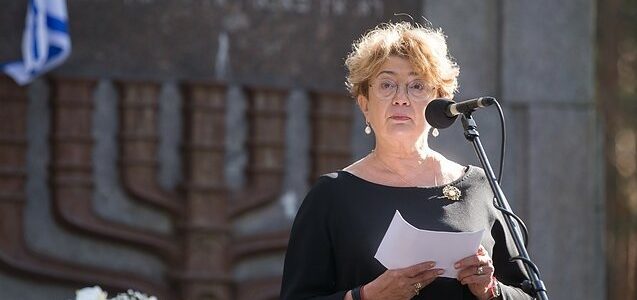Honored guests,
I stand before you in order to deliver a speech, but this place and this sad occasion calls for concentrating and remaining silent. The reflection, respect and humble silence which meets every thinking and feeling person in this place cannot be confused with the silence of apathy, ignorance and fear. All of us have kept silent too long. Too long. We have kept quiet about what happened, where it happened and why. It was kept quiet for most of those eight decades we count since the beginning of the Holocaust in Lithuania. Out of fear? Ignorance? Apathy?
So now I cast aside the desire to keep silent out of reflection and respect, and instead I will speak about those who cannot speak for themselves. About the murdered and exterminated. Here, around us, there are around 70,000 such people. Another 200,000 rest in Lithuania’s forests and fields. One day they were alive, the next they weren’t. One day they were selling, studying, teaching, celebrating, praying and creating, and the next day those people were gone. What remained? Their empty houses, their things, their deeds. Memory should’ve remained as well, but it seems it kept silent, too, for a very long time. The memory of neighbors kept quiet, and the memory of those who saw, heard and observed also maintained silence. Those who took part in the mass murder kept very quiet, and for many of them their silence helped them escape justice.
At least secular justice, because in the face of eternity their evil works are not just crimes against humanity, they are indelible, unforgivable stains on the conscience. What has come from this silence? What has come is that a portion of the Lithuanian public still cannot comprehend the tragedy which occurred, the carefully planned and executed extermination of hundreds of thousands of Lithuanian citizens and Jews resident in Lithuania. This is not surprising, more than one generation has grown up knowing nothing about this. There is a lack of consistent education. There is no lack of periodic commemoration, but there is a lack of people, of teachers who tell the story of the Jews of their town. There is a lack of agreement on what happened as well. We talk so much about who is guilty and who is innocent, but we forget the main thing.
To me, the main thing is very simple. The Lithuanian Jewish community was almost entirely exterminated during World War II. The survivors remain till now grateful to their rescuers, without whose goodness I wouldn’t be here now. But there keep appearing those who want to interpret and explain this basic thing and place responsibility on the Jews themselves, those who cast aspersions on the course of events or blame the war for everything, saying if they hadn’t killed they would have been killed themselves. No, friends, these flights of speculation do not deny the basic fact that mass murders were carried out in the towns and cities. Neither do they negate another fact, that brave people came forward for whom these “rules of war” were not superior to human goodness. They risked their lives to save those who were denied hope and the right to live.
This year we mark the 80th anniversary of the beginning of the Holocaust in Lithuania. This anniversary is especially painful for the Jewish community. We have visited many sites where Jews were murdered. I think about the children who were murdered 80 years ago, who would’ve been respected seniors among us now, who would have connected the past with the present and who would serve as the foundation of the community and the transmitters of culture. The absolute majority of them lie in cold unvisited graves. An entire generation, along with parents and grandparents, with their unborn brothers and sisters, now eighty years in the ground. There is where Yitzhak Rudashevski is, a high school student from Vilnius who wrote about what he saw in the Vilnius ghetto in his diary, and who sensed he would be killed. He was. He wrote and spoke in Yiddish, a language which almost passed out of use completely.
This is the language in which the Jews brought in to be shot said their final words to their loved ones, to their children and parents murdered before their eyes. Today we listen to children reciting passages in Yiddish. This is a language they didn’t learn from the lips of their grandparents or great-grandparents, but from books at Jewish school, along with Hebrew, in which those murdered here prayed, thus preserving the languages of their forefathers.


